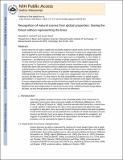| dc.contributor.author | Greene, Michelle R. | |
| dc.contributor.author | Oliva, Aude | |
| dc.date.accessioned | 2012-05-04T15:19:50Z | |
| dc.date.available | 2012-05-04T15:19:50Z | |
| dc.date.issued | 2009-03 | |
| dc.date.submitted | 2008-08 | |
| dc.identifier.issn | 0010-0285 | |
| dc.identifier.issn | 1095-5623 | |
| dc.identifier.uri | http://hdl.handle.net/1721.1/70499 | |
| dc.description.abstract | Human observers are able to rapidly and accurately categorize natural scenes, but the representation mediating this feat is still unknown. Here we propose a framework of rapid scene categorization that does not segment a scene into objects and instead uses a vocabulary of global, ecological properties that describe spatial and functional aspects of scene space (such as navigability or mean depth). In Experiment 1, we obtained ground truth rankings on global properties for use in Experiments 2–4. To what extent do human observers use global property information when rapidly categorizing natural scenes? In Experiment 2, we found that global property resemblance was a strong predictor of both false alarm rates and reaction times in a rapid scene categorization experiment. To what extent is global property information alone a sufficient predictor of rapid natural scene categorization? In Experiment 3, we found that the performance of a classifier representing only these properties is indistinguishable from human performance in a rapid scene categorization task in terms of both accuracy and false alarms. To what extent is this high predictability unique to a global property representation? In Experiment 4, we compared two models that represent scene object information to human categorization performance and found that these models had lower fidelity at representing the patterns of performance than the global property model. These results provide support for the hypothesis that rapid categorization of natural scenes may not be mediated primarily though objects and parts, but also through global properties of structure and affordance. | en_US |
| dc.description.sponsorship | National Science Foundation (U.S.) (Graduate Research Fellowship) | en_US |
| dc.description.sponsorship | National Science Foundation (U.S.) (Grant 0705677) | en_US |
| dc.description.sponsorship | National Science Foundation (U.S.) (Career Award 0546262) | en_US |
| dc.description.sponsorship | NEC Corporation Fund for Research in Computers and Communications | en_US |
| dc.language.iso | en_US | |
| dc.publisher | Elsevier B.V. | en_US |
| dc.relation.isversionof | http://dx.doi.org/10.1016/j.cogpsych.2008.06.001 | en_US |
| dc.rights | Creative Commons Attribution-Noncommercial-Share Alike 3.0 | en_US |
| dc.rights.uri | http://creativecommons.org/licenses/by-nc-sa/3.0/ | en_US |
| dc.source | PubMed Central | en_US |
| dc.title | Recognition of natural scenes from global properties: Seeing the forest without representing the trees | en_US |
| dc.type | Article | en_US |
| dc.identifier.citation | Greene, Michelle R., and Aude Oliva. “Recognition of Natural Scenes from Global Properties: Seeing the Forest Without Representing the Trees.” Cognitive Psychology 58.2 (2009): 137–176. Web. | en_US |
| dc.contributor.department | Massachusetts Institute of Technology. Department of Brain and Cognitive Sciences | en_US |
| dc.contributor.approver | Oliva, Aude | |
| dc.contributor.mitauthor | Oliva, Aude | |
| dc.contributor.mitauthor | Greene, Michelle R. | |
| dc.relation.journal | Cognitive Psychology | en_US |
| dc.eprint.version | Author's final manuscript | en_US |
| dc.type.uri | http://purl.org/eprint/type/JournalArticle | en_US |
| eprint.status | http://purl.org/eprint/status/PeerReviewed | en_US |
| dspace.orderedauthors | GREENE, M; OLIVA, A | en |
| mit.license | OPEN_ACCESS_POLICY | en_US |
| mit.metadata.status | Complete | |
